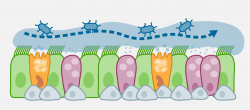Congratulations!


NephGen PI Peter Walentek receives an ERC grant of two million euros for his research on how tissues change their function through different cell types and what role this plays in diseases
Two million euros for research into the adaptability of tissues: Peter Walentek has been awarded a prestigious ERC Consolidator Grant. As announced by the European Commission on December 3, the MAGIX project will be funded for five years starting in mid-2025. Walentek and his team of researchers are investigating why some tissues are so adaptable and which mechanisms cause this adaptability to fail in diseases. In particular, the scientists are investigating the function of mucociliary tissues, which play various important roles in the body, be it in the lungs, the female reproductive tract or the intestine.
Mucociliary tissues: the body’s protective shield
Mucociliary tissues are true all-rounders in the human body. They are made up of mucus-producing cells and cells with tiny hairs, called cilia. In the lungs, they work together to transport dirt, bacteria and other harmful substances out of the body. In the fallopian tube, it moves the egg. “We want to understand how tissues are able to perform protective functions through the combination of certain cell types and how this function changes due to altered cell combinations, for example in diseases or during evolution,” said Walentek.
The team is using the frog as a model to investigate the role of these tissues in the early colonization of the intestine by microorganisms. “Dr. Walentek’s research may not only provide new insights into human disease mechanisms, but also contribute to the development of improved therapies,” says Prof. Dr. Gerd Walz, Medical Director of the Department of Internal Medicine IV at the Freiburg University Medical Center.
People with chronic respiratory diseases could benefit in the long term
Using a combination of genetic tools, single-cell analyses and mathematical models, the team aims to decipher the exact mechanisms behind the formation and function of the cell types. “Ultimately, we want to understand which genetic and epigenetic factors ensure that tissues can perform their specific functions,” says Walentek.
“The research of Dr. Walentek and his team impressively demonstrates the importance of a deep understanding of the molecular mechanisms of tissues. The ERC grant is well deserved and underlines the strength of medical research here in Freiburg,” says Prof. Dr. Lutz Hein, Dean of the Medical Faculty at the University of Freiburg.
The results of the research could have far-reaching consequences: from improved diagnosis to tailored therapies for chronic respiratory diseases and other diseases in which mucociliary tissue is affected. Chronic respiratory diseases in particular could benefit from the findings, as the protective mechanisms of these tissues are often disrupted.
Original title of the project: MAGIX-Mucociliary Adaptations and Gut Microbiome Establishment in Xenopus.
Caption: Schematic of the lung epithelium: The figure shows how cells with cilia (green) work together with mucus-forming cells (yellow, purple) to effectively remove pathogens from the lung. Image Source: CIBSS / P. Walentek & M. Rössler





